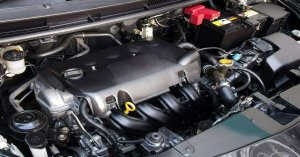The ground is what connects the negative terminal of the battery to the chassis of the vehicle.
It establishes a link between the vehicle’s electrical system and the source of electricity, completing the circuit to ensure a seamless relay of current.
All electrical components in the vehicle depend on good ground to function properly.
But apart from lights, switches, and batteries the ground also controls the function of certain key components which help your car operate.
If you have a bad engine ground you will face several random and puzzling issues with your car including charging
problems, electrical failures both when the vehicle is not and at rest, and even trouble starting the vehicle.
- Ignition coil failure
- Dim or Flickering Lights
- Sporadic failure of Electrical devices
- Faulty fuel pump
- AC compressor clutch Not Engaging
- Failure of sensors
- ECU Malfunction
- Bad transmission cables
- Rough or No starting
- Dead battery
Ignition coil failure- The primary windings of the ignition coil is connected to the chassis of the vehicle via ground which supplies the flow of current through the engine control module.
A Bad ground decreases the supply of current necessary for the ignition coil to convert low-voltage/high-current electricity in its primary coil into high-voltage/low-current power in the secondary windings.
This put excessive strain on the ignition coil, eventually causing it to fail.
Dim or Flickering Lights- Another common sign you have bad ground is dim or flickering lights. Generally, intermittently dim headlights are caused by either a fault with the bulb itself or a broken circuit.
A halogen bulb nearing the end of its life will flicker now and then to give you the telltale signs of replacement however if you’ve bought the pair recently, you can conclude a problem with the ground wire.
Sporadic failure of Electrical devices – One minute the AC works, the next second it doesn’t, or interior lights go out with the connotations of a horror movie.
Your vehicle is fitted with several components that are mechanically independent but rely on a proper circuit connection to facilitate the flow of current.
If the flow of current is impeded intermittently by a loose or bad engine ground strap, you could face such an issue where driving on rough terrain knocks your flimsy connection out of order rendering the failure of your vehicle’s electrical parts sporadically.

Faulty fuel pump- While a host of issues can prevent your car from turning on, the complete absence of actual fuel introduction in the engine exists.
when the gas tank is filled to the brim can have your car turned turtle as you scratch your head for why it’s not starting.
A malfunctioning fuel pump that drives very little or no fuel in the engine can be caused by a bad ground wire connection to your vehicle’s chassis. This issue is known to be also a work of rust and corrosion.
A poor or missing connection can result in a complete fuel pump failure, though the odds of the ground circuit being broken completely are quite unlikely giving you enough signals and time to get on top of the matter.
A much more likely and common scenario is a disturbance in the ground circuit. We recommend not to ignore any symptoms of a bad ground strap and get the connection checked if you find a drop in your fuel economy or face ignition issues.
AC compressor clutch Not Engaging- Another symptom of bad ground is the malfunctioning air conditioner. However, this is one of the more clear-cut signs of a bad engine ground wire as the problems of compressor clutch engagement are caused mainly by Low-pressure lockout,
bad clutch coil, and ground wire. AC compressor engages in receiving power from the electrical system.
If the electrical connector relaying current to the clutch coil is loose it will not engage properly while in case the ground is producing a temporary connection sufficient enough to allow the compressor to run,
it will cause the clutch to engage and disengage momentarily.
Failure of sensors- A failing sensor is one of the hardest things to diagnose without proper equipment and one of the most crucial errors that manifests in multiple forms.
There are numerous useful sensors within a vehicle like GPS, but what we are concerned with are the few that affect the normal functioning of the vehicle.
If the ground wire in your vehicle is faulty, sensors like the coolant temperature sensors and oxygen sensors responsible for tasks like emissions control and fuel mixing will begin to shut down.
Though you might not notice any difference until you find your carbon footprints to be beyond the accepted range at your next emissions test.
To stay ahead, we recommend keeping a close eye on your engine performance as sensors like coolant, exhaust, AC, etc influence the normal operation of a vehicle.
ECU Malfunction- The engine control unit is the brain of a vehicle that uses signals from several sensors, relaying information to be processed and utilized for the best performance of the engine.
Fluctuation of current due to a faulty connection of ground that connects to the chassis of the vehicle renders the information processed by the components inaccurate, resulting in an improper calculation of data from the ECU.
If you find your fuel economy going up sharply or just an overall misbehaving engine, you could in need of the correction of your electrical ground wire.
Bad transmission cables- These cables are used for setting the transmission into the gear indicated by the shift selector. Some vehicles use a manual transmission,
carrying two cables while the more modern cars come equipped with an automatic transmission system, sporting a single cable. Both automatic and manual shift selector cables rely on a proper engine ground wire circuit for a smooth transition between gears.
In case of a bad ground strap, any surge in or drop in power will have the current struggling to find ground and cause it to find a direct path wreaking damage to the transmission cables and other parts in the transmission system.
If you feel jerky transitioning in acceleration or notice the failure of the automatic gear selector it could be another sign of a broken engine ground.
Hard or No starting- The ignition process requires a closed path of current to occur optimally. A bad wire connection or open circuit will hinder the electrical process that cranks the engine and cause a hard start.
If you constantly find yourself unable to start your car or if the vehicle always calls for multiple tries to turn over, you may need to check the electrical system of your vehicle.
Dead battery- Another sign of bad ground is a dead battery. Since the ground is what connects the battery to the vehicle, a firm connection of the same is indispensable for the proper and secure relay of current.
A loose ground wire can prevent the alternator from delivering an adequate amount of charge to the battery causing it to drain faster and eventually die.
How To Test If You Have A Bad Engine Ground
You can check for ground connection errors using a multimeter.
Firstly set the device to read ohms (resistance) to perform the test.
Then disconnect the negative terminal and clip one end of the multimeter.
Touch the other end anywhere in the area on a part that is metal. It shouldn’t be plastic.
Record the readings, anything in the vicinity of 12.6 ohms would be the optimal reading.
Though reading alone would not tell you if you have a bad engine ground. You need to listen for a continuous beep sound when you touch the metal item. If you don’t, it means you have a breakage in connection somewhere in the vehicle.


